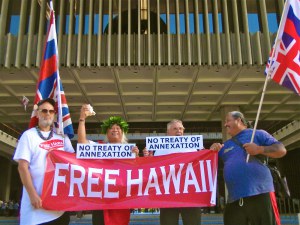
By Tom Yamachika June 1, 2014
Special to West Hawaii Today
The Office of Hawaiian Affairs was just in the news because its CEO, Kamanaopono Crabbe, wrote a letter to U.S. Secretary of State John Kerry asking for a legal opinion on Hawaii’s sovereign status. One of the key questions raised in the letter is “Does the Hawaiian Kingdom continue to exist?”
I will leave it to others to answer that question, but, supposing the Kingdom coexists with the State of Hawaii, what tax and public finance implications can we expect?
Throughout its history, the U.S. government has had to coexist with independent sovereign entities known as Native American tribes. During this time, rules and procedures have been adopted allowing both to exist with a fair amount of autonomy and dignity for each. The Akaka Bill aimed to reconstitute a Native Hawaiian governing entity and then have it recognized by the federal government the same way Native American tribes are.
Typically, tribes have space set aside within a state, which we call a “reservation.” On the reservation, the tribal government not only provides governance, but also provides the services necessary to maintain a civilized society. Those services, like any others provided by any other government, need to be paid for. So the tribal government has the power to impose taxes upon those living on the reservation. Those on the reservation pay tribal taxes, not state or federal taxes. But neither the state nor the federal government is obligated to provide the reservation with infrastructure, police, fire protection, a militia, or anything else people typically look to government to provide.
By the same token, anything off the reservation is part of the state. An individual living off the reservation, even though ethnically or otherwise a member of a tribe, is considered a state resident and pays federal and state taxes like any other resident. This makes sense because that person is a beneficiary of the services and society provided by the federal and state governments, and should pay for those services like any other person living there.
The same theories apply for the island possessions of the United States, such as Guam and American Samoa. Each island has a government that imposes its own tax and provides its own services. For example, those living in Guam pay Guam tax, while ethnic Guamanians living in the U.S. pay federal and state taxes.
Applying these concepts to the Native Hawaiian situation raises familiar issues. The Kingdom of Hawaii currently has neither a monarch nor anything generally recognized by its members as a government. That’s why the Akaka Bill proposed, and the Native Hawaiian Roll Commission is moving toward, a process for getting a number of Native Hawaiians together and having them organize themselves.
Once that happens, however, some kind of dedicated space is needed for the nation-within-a-nation model to work. We certainly hope that no one is thinking the citizens of the reconstituted Kingdom living on state lands, and taking advantage of the benefits and services offered by the state and federal governments, will then claim they don’t have to pay for them. That’s simply not reasonable. People paid taxes in the old Kingdom, and those in the reconstituted Kingdom shouldn’t expect something different. We all need to be aware that both benefits and burdens flow from being a part of civilized society.
Tom Yamachika is interim president of the Tax Foundation of Hawaii.
